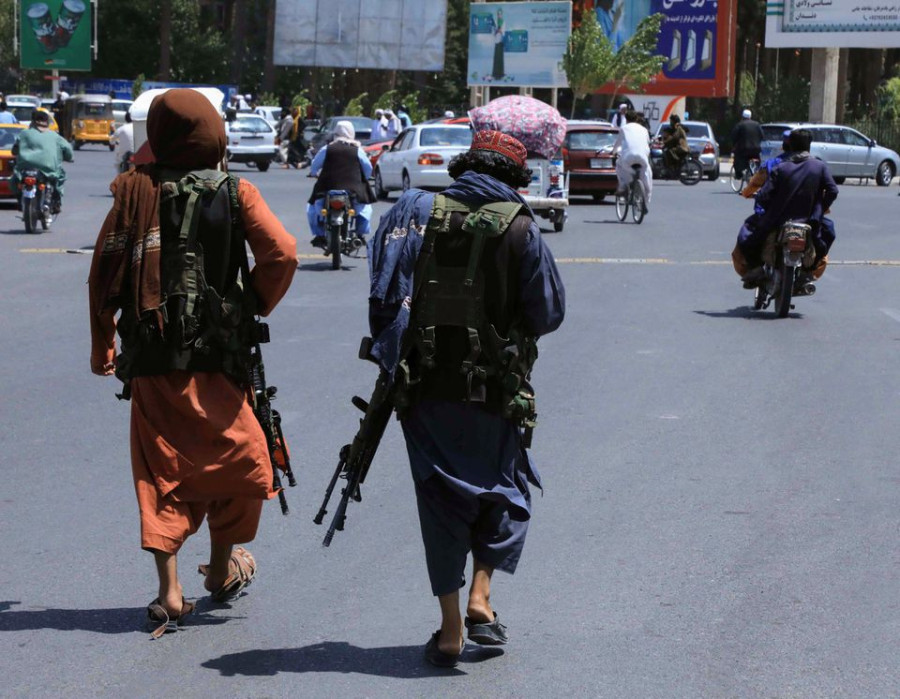Editorial
Taliban takeover
Nepal must explore routes to engage diplomatically with the militant group.
Tensions rise in Afghanistan, marred by fighting in the past month, culminating in the sudden Taliban takeover of the capital Kabul on Sunday. As nations conduct panicked evacuations of diplomats and citizens, the Taliban in charge vow no haven for terrorists. But the return of the infamous Islamic militant group known for its brutality and radical Islam is already accelerating international concerns of human rights, especially for women and children, and global security threats posed by Islamist radicals and transnational terrorist networks.
The fight against al-Qaeda, the militant Islamist group responsible for the 9/11 attacks harboured by the Taliban, was the casus belli for the United States and North Atlantic Treaty Organisation invasion of Afghanistan 20 years ago. On Tuesday, NATO said the Taliban must not let terrorism gain a foothold, and warned of a military strike from a distance if Afghanistan became a breeding ground for terrorists again. “Those now taking power have the responsibility to ensure that international terrorists do not regain a foothold,” NATO Secretary-General Jens Stoltenberg said after the Taliban takeover of Kabul.
Now that the Taliban is back in power following the US and NATO pullout, Afghan observers and diplomacy experts say the takeover will have consequences for the world. The quick Taliban victory and the power vacuum it has created will further escalate the global threat of radicalisation and terrorism, they say. Dhaka was quick to respond that the Taliban takeover will impact the region and beyond, and said Afghanistan is an “integral part of South Asia” and that the leadership feels the region “must grow and prosper together”.
South Asia witnessed some significant incidents in the weeks leading to the shock Taliban takeover of Afghanistan. In Khyber Pakhtunkhwa Province in Pakistan, a bus carrying Chinese hydropower developers was blown up, killing nine Chinese engineers and three Pakistani soldiers. In the capital Islamabad, the daughter of the Afghan ambassador to Pakistan was kidnapped and injured by unknown assailants and released several hours later, leading the Afghan Foreign Ministry to recall its ambassador and other senior diplomats. In India, security forces continued operations against militant groups in Jammu and Kashmir Union Territory. Nepal, the current chair of the South Asian Association for Regional Cooperation, must recollect the 1999 hijacking of an Indian Airlines jet en route to Delhi from Kathmandu with 180 people on board, which was flown to Taliban-controlled Kandahar in Afghanistan, where hijackers negotiated the release of three Kashmiri militants in exchange for the passengers.
There is little doubt that the collapse of the civilian government in Afghanistan will add to these uncertainties, but the region has failed to answer difficult questions after US President Joe Biden set a formal deadline for its military operations. But this is also an opportunity for the region to engage with the Taliban, especially after their assurances to the international community, especially the US and neighbouring countries, that Afghanistan won’t be used against them. The Deuba administration, which is yet to appoint a foreign minister, must feel the heat of the fast deteriorating situation. It must use all its resources and engage with the international community to ensure the safe and swift evacuation of all Nepalis stuck in Kabul. Second, the leadership must explore routes to engage diplomatically with the Taliban instead of a wait-and-watch policy and introspect how Nepal’s policy in Afghanistan will evolve shortly now that Pakistan, China and Russia have communicated their interest to work with the Taliban.




 8.22°C Kathmandu
8.22°C Kathmandu














